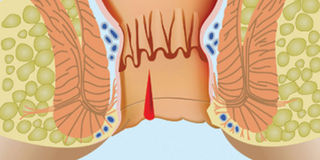How to deal with piles

Hi Doc,
I am 27 years of age and have developed a problem, in that, whenever I go for a long call, I feel some pain.
The problem started with an itch, but has now become worse; the anal area is swollen and my stool blood-stained.
Also, the itching has become so unbearable that I find it difficult to sit still. I have been to a clinic but the problem was not solved. What could be the cause of this and how do I go about curing it?
Regards,
Mark
Dear Mark,
Based on the symptoms of the anal swelling and pain, I would say that you are most likely suffering from a condition called haemorrhoids, or piles.
This is caused by swollen veins of the anal area and lower part of the large intestines, including the rectum.
There are two types of haemorrhoids: Those that protrude through the anus and those that do not protrude. When you pass stool, especially if the stool is hard, the haemorrhoids break, leading to some bleeding, usually noted after wiping with tissue.
A haemorrhoid can cause a lot of pain when passing stool and person may feel uncomfortable when sitting. They can also cause itchiness around the anal area.
The exact cause of is not known, but the condition is believed to be caused by increased pressure in the veins in the anal region.
One common cause of increase in this pressure is straining when passing stool, especially if the stool is hard during constipation. The hard stool and straining over a long period of time causes friction around the anus, leading to a build-up of pressure in the veins, which eventually swell.
The longer stool stays in the rectum, the harder it becomes, thus making it more difficult and more painful to pass. This increases the chance of a bleed when you do pass.
Other causes are heavy straining during strenuous exercise or when lifting heavy loads, sitting for long periods of time, anal infection or even liver diseases like cirrhosis.
One common cause that I need to mention, but is not be related to your condition, is pregnancy and child birth.
The pressure of the pregnancy and the strain during childbirth increases the pressure in the anal veins.
You mentioned visiting a clinic. Were any tests done? What treatment were you given? For mild cases, there is a conservative treatment which can be done at home.
This form of treatment involves the use of warm salty water to clean the anal region, laxative medicines to soften stool, over-the-counter creams applied to the anus to reduce pain and swelling and also medication to reduce the swelling.
For advanced cases of haemorrhoids, where they are very large and the blood inside clots, the treatment of choice is the surgical removal of the piles.
What NOT to do when you have piles
- Do not wear synthetic underwear, go for cotton
- Do not use dry or perfumed tissue as this will irritate the haemorrhoids. Use non-perfumed, moistened wipes instead (baby wipes)
- Do not scratch the area because this breaks the haemorrhoids and bleeding occurs. Also, nails may have germs that can lead to infection
How to prevent haemorrhoids
The best way to prevent haemorrhoids is by preventing constipation. To reduce chances of constipation, you need to drink plenty of water and eat foods and supplements rich in fibre (like fruits, vegetables and natural foods).
You may also use stool softeners to help reduce straining. Once in the toilet, reduce the time spent passing stool and clean yourself adequately to reduce the chances itching. If possible, use water.
Mark, considering that you were seen at a healthcare facility, I suggest that you visit a general surgeon who will be able to assess your condition and provide the appropriate treatment.
What to eat
The most practical way is to consume whole food with every meal. These are fruits, vegetables, brown rice, whole maize, whole wheat products, legumes (all beans and peas), oats, bran, and barley, and to consume less processed and junk foods. Processed foods have the fibre component of the food removed.
Why fibre is important in your diet
Constipation is a nightmare for many people, and one of the ways to avoid this is by having a diet rich in fibre (the portion of your food that your body cannot digest).
After all the food is digested, fibre remains unchanged and is passed in the stool the same way it was when it was eaten. You need it because:
- It ensures steady and faster movement of food through the bowels. This prevents constipation and all the conditions associated with constipation e.g. haemorrhoids, diverticulitis and anus cracks
- It occupies space and helps to create a feeling of fullness, meaning we can eat less and stay full for longer. This is critical in ensuring a steady body weight by controlling caloric intake
- Though not well understood, it has been proven that fibre helps to reduce incidence of colorectal cancer. Communities that consume foods with a lot of fibre have almost no incidence of colorectal cancer, whereas those that have a diet low in fibre have much higher colorectal cancer incidence
Regards,
Dr Torooti Mwirigi
Send your medical questions to [email protected] for free professional guidance.




